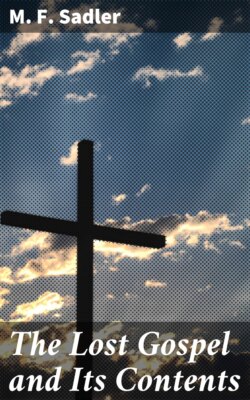Читать книгу The Lost Gospel and Its Contents - M. F. Sadler - Страница 12
На сайте Литреса книга снята с продажи.
[GREEK TABLE]
ОглавлениеPistin de kai charan labousa | Maria hê parthenos euangelizomenou | autê Gabriêl angelou, hoti pneuma | Pneuma hagion epeleusetai epi kyriou ep' autên epeleusetai, | se, kai dynamis hypsistou kai dunamis hypsistou episkiasei | episkiasei soi, dio kai to gennômenon autên, dio kai to gennômenon | hagion klêthêsetai Hyios Theou. ex autês hagion estin Hyios Theou, | * * * * * apekrinato, Genoito moi kata to | Genoito moi kaia to rhêma sou. rhêma sou. |
Now of these words, as existing in St. Luke, the author of "Supernatural Religion" takes no notice. Was he, then, acquainted with the fact that Justin's words in this place so closely correspond with St. Luke's? We cannot say. We only know that he calls his readers' particular attention to a supposed citation of the previous words of the angel Gabriel, cited in another place:—
"Behold thou shalt conceive of the Holy Ghost, and shalt bear a Son,
and He shall be called the Son of the Highest, and thou shalt call
His name Jesus, for He shall save His people from their sins."
(Apol. I. ch. xxxiii.)
The ordinary unprejudiced reader would say that Justin here reproduces St. Matthew and St. Luke, weaving into St. Luke's narrative the words of the angel to St. Joseph; but our author will not allow this for a moment. He insists that Justin knew nothing, or need have known nothing, of St. Luke. He shows that the words of the angel, "He shall save his people," &c., which seem to be introduced from St. Matthew, "are not accidentally inserted in this place, for we find that they are joined in the same manner to the address of the angel to Mary in the Protevangelium of St. James."
But how about those words which succeed them in answer to the question of the Virgin, "How shall these things be?" I mean those quoted in the "Dialogue" beginning "The Holy Ghost shall come upon thee," &c. If ever one author quotes another, Justin in this place quotes St. Luke. They cannot be taken from the Protevangelium, because the corresponding words in the Protevangelium are very different from those in St. Luke; and the only real difference between Justin's quotation and St. Luke is that St. Luke reads, "shall be called the Son of God;" whereas Justin has "is the Son of God." Now in this Justin differs from the Protevangelium, which reads, "Shall be called the Son of the Highest;" so the probability is still more increased that in the quotation from the "Dialogue" he did not quote the Protevangelium, and did quote St. Luke. However, we will make the author a present of these words, because we want to assume for a moment the truth of his conclusion, which he thus expresses:—
"Justin's divergencies from the Protevangelium prevent our supposing that, in its present form, it could have been the actual source of his quotations; but the wide differences which exist between the extant MSS. of the Protevangelium show that even the most ancient does not present it in its original form. It is much more probable that Justin had before him a still older work, to which both the Protevangelium and the third Gospel were indebted." ("Supernatural Religion," vol. i. p. 306.)
Assuming, then, the correctness of this, Justin had a still older Gospel than that of St. Luke; and we shall hereafter show that St. Luke's Gospel was used in all parts of the world in Justin's day, and long before it. Now Justin himself lived only 100 years after the Resurrection; and this is no very great age for the copy of a book, still less for the book itself, of which any one may convince himself by a glance around his library. We may depend upon it that Justin would have used the oldest sources of information. A book so old in Justin's days may have been published at the outset of Christianity. The author himself surmises that it may have been the work of one of St. Luke's [Greek: polloi]. Anyhow it is an older and therefore, according to the writer's own line of argument all through his book, a more reliable witness to the things of Christ, and its witness is to the supernatural in His Birth. Are we, then, able to form any conjecture as to the name of this most ancient Gospel? Yes. The author of "Supernatural Religion" identifies it with the lost Gospel to the Hebrews, in the words:—
"Much more probably, however, Justin quotes from the more ancient source from which the Protevangelium and perhaps St. Luke drew their narrative. There can be little doubt that the Gospel according to the Hebrews contained an account of the birth in Bethelehem, and as it is, at least, certain that Justin quotes other particulars from it, there is fair reason to believe that he likewise found this fact [28:1] in that work." (Vol. ii. p. 313.)
If, then, this be the Gospel from which Justin derived his account of the Nativity, it seems to have contained all the facts for which we have now to look into St. Matthew and St. Luke. It combined the testimonies of both Evangelists to the supernatural Birth of Jesus.
